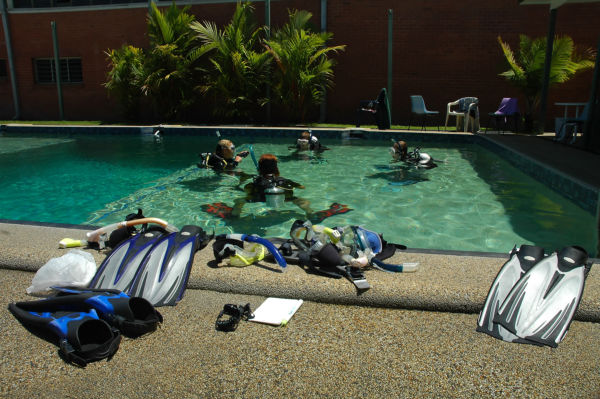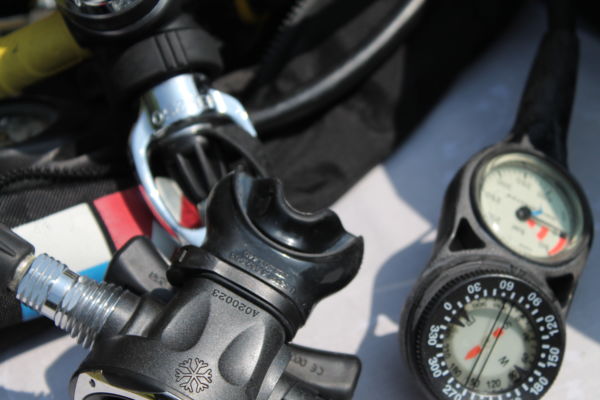You’ve passed your open water course and you’re hooked. Scuba diving has become your passion and will change your choice of vacation destination forever. You could continue to use rental equipment, but whose spit was last in the mask you’re using? Whose mouth was last on the regulator? Has the wetsuit been cleaned properly? Especially in the age of Covid-19, owning your own dive gear has become even more appealing. Although buying your first set of scuba gear is not a cheap proposition, neither is continually renting.
Using your own gear, knowing that it’s in good condition, and that it fits you perfectly will help you relax and get the most out of your underwater experiences. But, with such a variety of brands, designs, and styles on offer, it can seem like a daunting task. Here we examine some of the things to consider when buying your first set of scuba gear.
There’s no need to buy everything at once

You could walk into a dive shop and get outfitted in one go. The sales assistant will be thrilled, especially if they’re working on commission. But is that such a good idea? Buying your gear bit by bit can help spread out the cost. And doing it this way also gives you the chance to try different brands and styles as you continue renting equipment.
You’ll definitely want to start with the basics. Some dive centers prefer divers to have their own mask and snorkel, so that’s the best place to start. Once you’ve found a well-fitting mask, consider getting a set of comfortable fins and then build up your dive bag from there. Most divers also decide early on that a dive computer is an essential piece of gear to own when starting out, closely followed by an exposure suit.
You don’t need to break the bank
Buying your first set of dive gear doesn’t need to cost an exorbitant sum. It’s important to remember that cost is not the most important thing when choosing equipment. Just because something has a high price tag doesn’t mean it’s the best choice for you. Many quality brands produce options to suit all budgets. Your focus should be on fit, comfort, and functionality.
What sort of diving will you be doing?

When buying your first set of scuba gear, consider where you’ll be doing most of your diving. The equipment you need to dive in cold water will be different from the equipment you need to dive in warm water, for example. Think about the type of diving you want to do. If you’re just starting out, there’s no need to splash out on a dive computer that’s aimed at technical divers. And do you really need that BCD with 16 D-rings or a knife that Crocodile Dundee would be proud of?
Buy from a reputable source
Secondhand scuba gear is readily available on auction websites, and although that bargain on eBay may seem like a great deal, you should be careful. When buying used scuba equipment, it is difficult to know exactly what you’re getting. Sellers may claim that something is “as new,” but how do you know how many times it’s been used or when a regulator or computer was last serviced — or if it ever has been?
Supermarkets often sell low-cost masks and snorkels. These are aimed at snorkelers and not designed or tested for depth. Buy a mask that’s made for scuba diving, with quality tempered glass.
Some dive schools change their equipment every couple of years and will often sell their old gear. It’s possible to pick up a great deal on their secondhand equipment, safe in the knowledge that it has been serviced regularly.
Speak to the professionals
Don’t be afraid to ask for advice. Speak to your instructor or divemaster. They will be happy to explain the differences in the equipment they’ve used over the years. Visit your local scuba club and talk with other divers about the features they like and the gear they own. You’ll find that divers are a friendly bunch who are probably all too happy to chat about equipment with you.
Also, do some online research. There are plenty of websites with reviews about different brands and styles of gear, along with their pros and cons.
Shop around
We don’t mean shop around to get the best price, rather, shop around so you can see the different kinds of equipment available. There are so many options that you’ll want to find what will suit you best. If possible, try things on. Many dive shops have arrangements with local clubs so divers can try certain bits of equipment before purchasing them.
Becoming a scuba addict is difficult to avoid. Your first set of gear is unlikely to be the only set you ever own. As you become more experienced and continue your education, you’ll probably want to upgrade or invest in more advanced pieces of kit.
So don’t let the prospect of buying your first set of scuba gear overwhelm you. Take your time, do your research, and, eventually, you’ll find the perfect equipment to enhance your underwater adventure.

